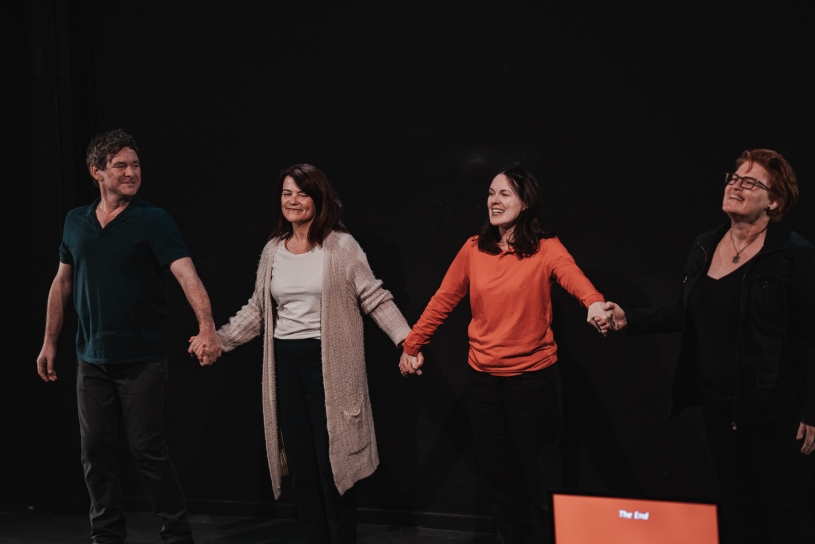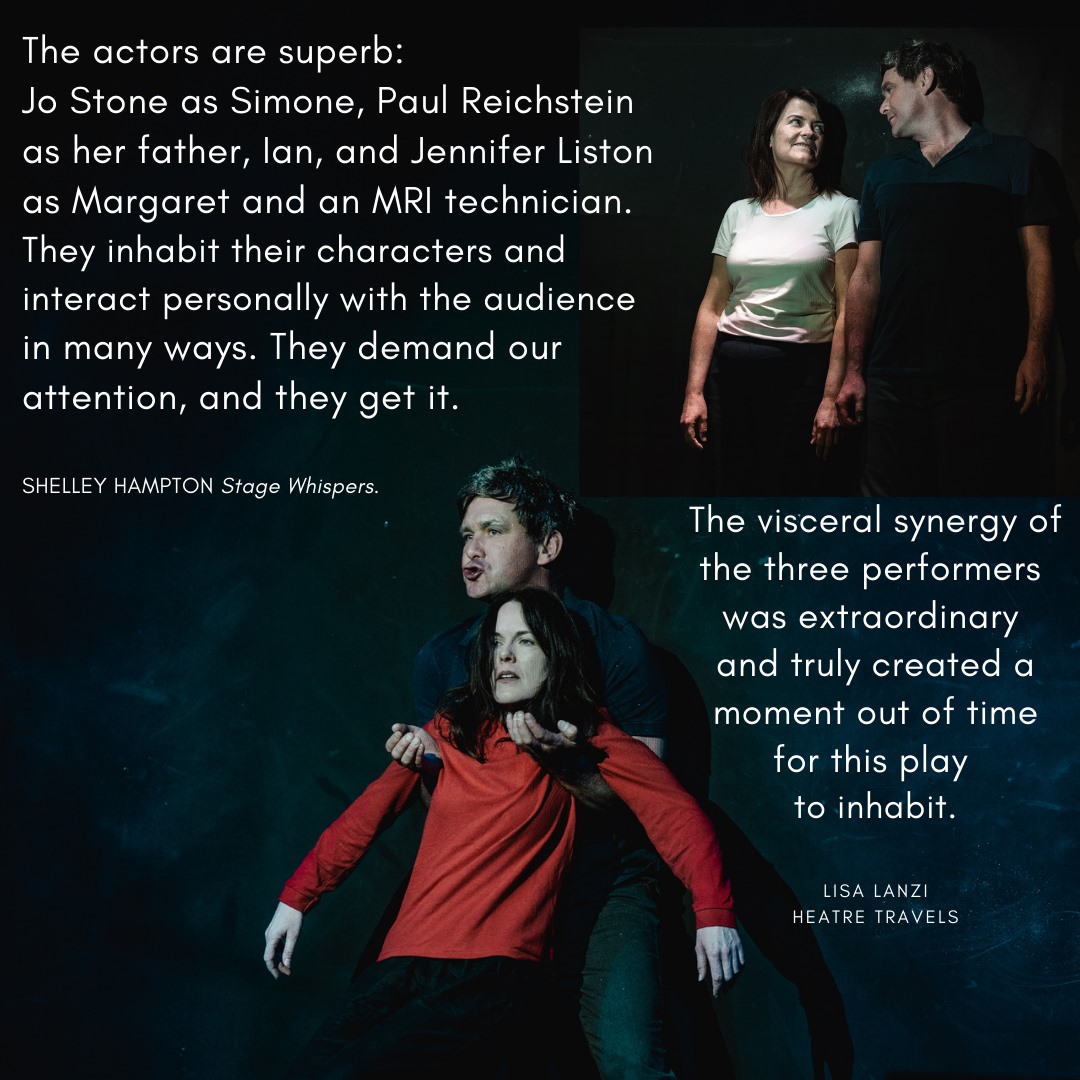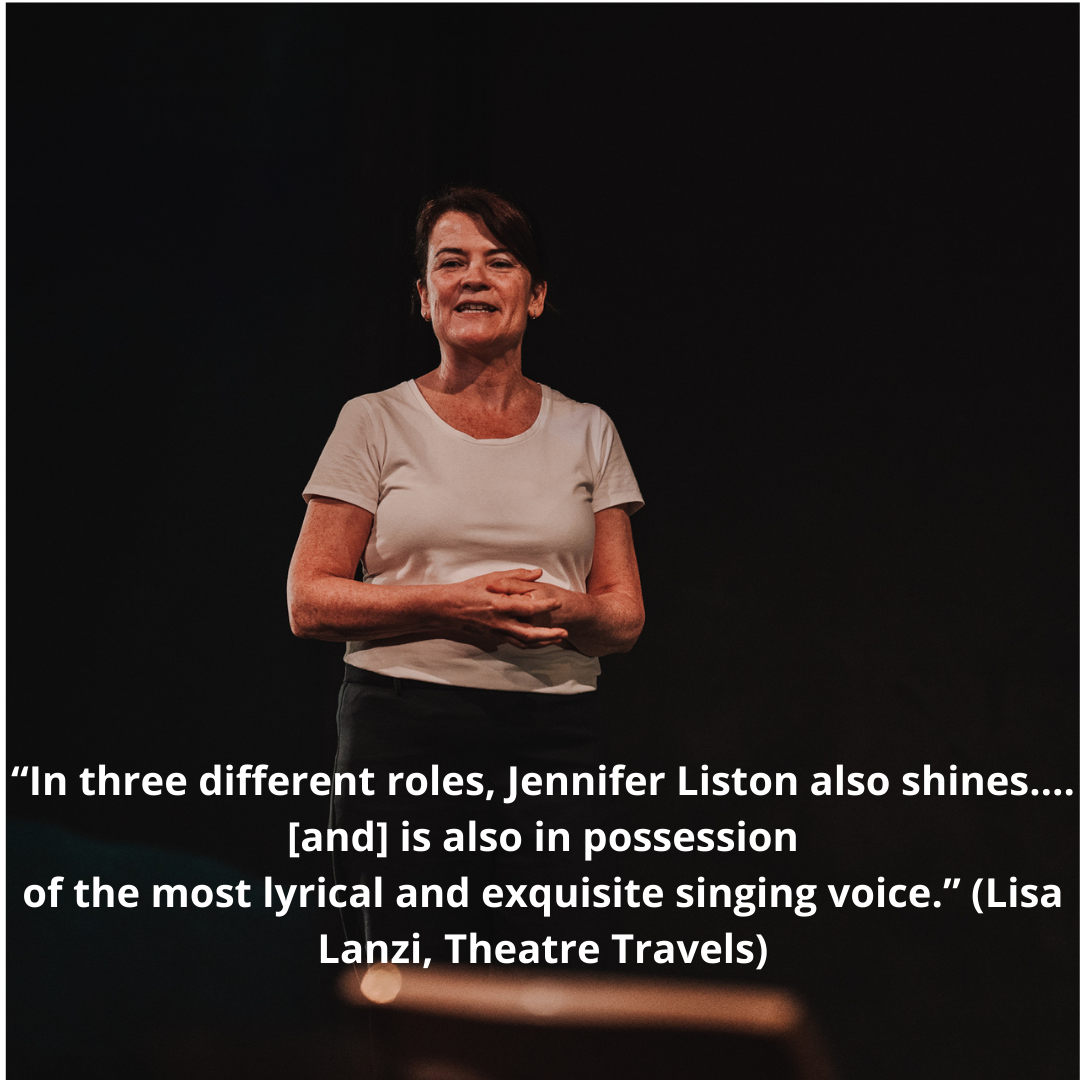Nov '21
25
I was privileged to have had the opportunity to be cast in the amazing play 'Clock for No Time', written and directed by all-round-talent Michèle Saint-Yves.
The play asks the question ‘What endures when we are gone?’ It juxtaposes the brain neuropathologies of Simone (who has an acquired brain injury) and her father Ian (who has advanced Alzheimer’s disease), and how facing the realities of their conditions in the context of a father-daughter relationship may help Simone find the answer.
The play’s season ran from 19–31 October 2021 at the Rumpus Theatre in Bowden, Adelaide. I was a last-minute recruit: the Sydney-based actor Gina Zoia who was originally to perform was unable to make it because of COVID-19 travel restrictions.

Cast of Clock for No Time (l-r): Paul Reichstein (Ian), Jennifer Liston (performer, MRI technician, Margaret), Jo Stone (Simone), Michèle St Yves (writer, director)
I was cast as a performer, the MRI technician, and as Margaret (Ian’s wife/Simone’s mother). I had to learn six poems, four songs (although I ended up singing only two), a monologue, and some tracts of dialogue within a few weeks.
Working alongside two stellar actors, from whom I learned so much, gave me such a buzz. Jo Stone (who played Simone), Paul Reichstein (who played Ian) and I shared many moments of laughter, tears, exhaustion, awe, and pure wonder. And we shared many gigglesome times with Michèle Saint-Yves too.
We certainly needed humour to manage our way through the serious intensity and emotional demands of the play (although it does have some wonderful comedic moments).
The play embedded access in performance and audience-inhabited spaces and was neurodivergent- and dementia-friendly. It had financial and in-kind support from many sources including Arts South Australia, the Richard Llewellyn Deaf and Disabled Artist Fund, the Department of Premier and Cabinet, SA COVID Arts recovery fund, and the State Theatre Company of South Australia.

We had two solid weeks to rehearse, a third week called ‘tech week’ which meant we didn’t always get many ‘run-throughs’, then the season itself – a run of 13 shows over two weeks.
The level of preparation and input on the tech side was amazing to witness, so capably envisioned and handled by Mark Oakley (AV/Digital & Technical Design). Production coordinator and stage manager extraordinaire Abbie Heuer kept us all safe, organised, on time and on our toes.

The reviews were thoughtful, considered, and very complimentary. I was so happy for Michèle because this play is courageous, brave and confronting.
Many thanks, Michèle, for that amazing, unforgettable opportunity.
All photos courtesy Saige Prime.
The play asks the question ‘What endures when we are gone?’ It juxtaposes the brain neuropathologies of Simone (who has an acquired brain injury) and her father Ian (who has advanced Alzheimer’s disease), and how facing the realities of their conditions in the context of a father-daughter relationship may help Simone find the answer.
The play’s season ran from 19–31 October 2021 at the Rumpus Theatre in Bowden, Adelaide. I was a last-minute recruit: the Sydney-based actor Gina Zoia who was originally to perform was unable to make it because of COVID-19 travel restrictions.

Cast of Clock for No Time (l-r): Paul Reichstein (Ian), Jennifer Liston (performer, MRI technician, Margaret), Jo Stone (Simone), Michèle St Yves (writer, director)
I was cast as a performer, the MRI technician, and as Margaret (Ian’s wife/Simone’s mother). I had to learn six poems, four songs (although I ended up singing only two), a monologue, and some tracts of dialogue within a few weeks.
Working alongside two stellar actors, from whom I learned so much, gave me such a buzz. Jo Stone (who played Simone), Paul Reichstein (who played Ian) and I shared many moments of laughter, tears, exhaustion, awe, and pure wonder. And we shared many gigglesome times with Michèle Saint-Yves too.
We certainly needed humour to manage our way through the serious intensity and emotional demands of the play (although it does have some wonderful comedic moments).
The play embedded access in performance and audience-inhabited spaces and was neurodivergent- and dementia-friendly. It had financial and in-kind support from many sources including Arts South Australia, the Richard Llewellyn Deaf and Disabled Artist Fund, the Department of Premier and Cabinet, SA COVID Arts recovery fund, and the State Theatre Company of South Australia.

We had two solid weeks to rehearse, a third week called ‘tech week’ which meant we didn’t always get many ‘run-throughs’, then the season itself – a run of 13 shows over two weeks.
The level of preparation and input on the tech side was amazing to witness, so capably envisioned and handled by Mark Oakley (AV/Digital & Technical Design). Production coordinator and stage manager extraordinaire Abbie Heuer kept us all safe, organised, on time and on our toes.

The reviews were thoughtful, considered, and very complimentary. I was so happy for Michèle because this play is courageous, brave and confronting.
Many thanks, Michèle, for that amazing, unforgettable opportunity.
All photos courtesy Saige Prime.





